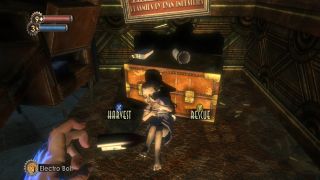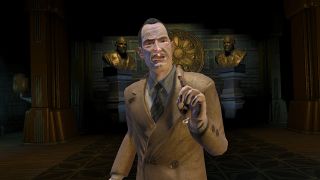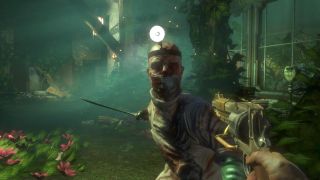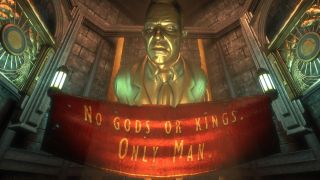“Would you kindly?” On the surface, it was always a simple quandary to wrestle with. We answered the call dutifully, locking ourselves into a wicked sense of forward momentum at the whim of an omnipotent narrator, pushing ourselves ever deeper into a submerged metropolis steadily taking on more and more water. But, as BioShock players would soon discover in the autumn of 2007, the question itself was loaded. A smoke-and-mirrors tactic that has come to define a certain era of first-person shooters – particularly in the hearts and hands of console-bound gamers.
One of the greatest magic tricks game developers ever pulled off was making it feel as if you ever were free inside of their worlds. There is, in any player-driven narrative experience – be it linear or otherwise – merely the illusion of choice and control. The medium is inevitably limited by the amount of content a team is able to create and implement; making players believe that they have even the slightest amount of influence on how events and story unfolds is all a part of a good narrative. BioShock turned this on its head entirely. It turned a trusted narrator against us; it forced us to confront the relationship between the sentience of the protagonist and the invisible guiding hand of the developer.

While the late game twist forced players to consider their own agency – to weigh up the numerous violations of trust and our inherent inability to question them throughout – the world of Rapture is appropriately established to drive reactive player emotion from the moment that the bathysphere first opens its doors. It’s a beautiful, wondrous place; its rusting 1950s aesthetic inviting us to explore the chaos beneath the waves, begging you to hope that the wrench you get your hands on will one day have another use besides beating in skulls – that perhaps by the end of this you can restore Rapture to its former glory. But soon that feeling is replaced with something else entirely: oppressive, aggressive fear. As, one by one, the layers are peeled back on the city, its citizens and the dark politics fuelling the disarray, any hope you have is quickly replaced by a desire to escape it all as quickly as humanly possible.
On your way to freedom, guided by the warring of words between Atlas and Fontaine, empathy with the citizens of Rapture is established, largely through environmental storytelling. It’s the first of many emotional tethers Irrational Games creates throughout the experience as it builds towards its twist reveal. While this manifested itself in fairly rote fashion – rooting through bins and listening to scattered audio diaries across the world – it helped the world feel real, like it had existed before you arrived and that it would continue to be after you eventually left it all behind. Forcing you to empathise with the very villains you were so intent on crushing only made the emotional moments – between deciding whether you would save the tortured Little Sisters or harvest them for resources – all the more impactful.
Deep seas, and an even deeper game

BioShock brought the immersive sim to console in a way that we hadn’t quite experienced before. The game does invariably share its DNA with the likes of System Shock and its sequel, on which director Ken Levine first cut his teeth, and that ensured that BioShock had a prociency to its core systems lost on many other genre games of the time. The feel of the weapons, their combination with the array of otherworldly Plasmids at your disposal, was a real delight.
The action was fast and kinetic, but nuanced enough to let us experiment with the tools you had found along the way – the enemy AI smart and aggressive, the depth to the combat system only expanding the further you dared push it. Seeing a Big Daddy wade into battle was forever a thrill, particularly as the various warring factions would converge as if by completely accident. BioShock offered some of the biggest thrills the infant console generation had seen, and its impact on the story-driven shooter is difficult to quantify.

Its lacklustre ending aside, BioShock was able to convincingly tell a story that any other medium would struggle to deliver. Irrational capitalised on the strength of the interactive format and delivered a narrative that is as challenging as it is unique; in playing with perception, trust and consequence, BioShock made players more aware of their agency than ever before. To be betrayed by your own actions – your own lack of awareness or perception – was startling. The action and combat sublime, the character development and world-building unrivalled.
A decade on and it’s as wonderful today as it was then; BioShock is a startling example of what can be achieved when a bold vision is achieved wholeheartedly by a group of passionate creatives.
This article originally appeared in GamesTM magazine. For more great coverage, you can subscribe here.


